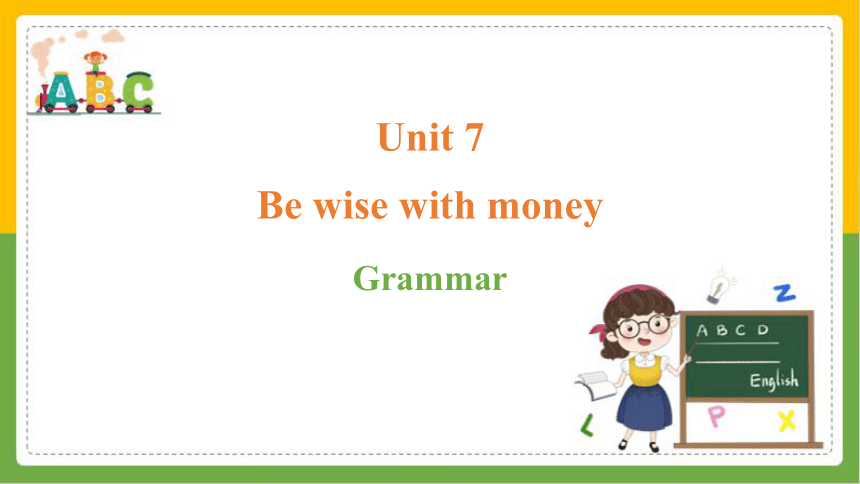(
课件网) Grammar Unit 7 Be wise with money 能掌握some和any的用法及区别。 能掌握there be结构的用法和其肯定句、否定句、一般疑问句及其肯否定回答的结构。 学习目标 Simon is talking to his mum before they go to the supermarket. Here is their conversation. Read the conversation carefully. Circle “some” and “any”, and then work out the rules. Mum: Let's go to the supermarket. We need some meat, ... and also some fruit and vegetables. Simon: OK, Mum. Please buy some bananas. They're my favourite. Mum: OK. Do we need any other things Simon: We don't have any drinks. Can we buy some, Mum Mum: Sure. 新课讲授 我们可以用some和any这样不定数或不定量的词来修饰名词。 some和any表示“一些”,既可以修饰可数名词,又可以修饰不可数名词。 some常用于肯定句,any常用于否定句或疑问句中。 注意:在疑问句中,我们在提出建议或请求时常用some,表示希望得到对方的肯定答复。如: Can you pass some sugar to me 你能递些糖给我吗? Would you like some drink 你想喝点饮料吗? Summary Work out the rule! We use some or any to talk about the amount of something. ●We often use _____ (some, any) with positive sentences. ●We often use _____ (some, any) with negative sentences and questions. some any Millie is talking to her mum about money plete their conversation with some and any. Millie: Mum, I have (1) _____ pocket money and I want to manage it well. Can you help me Mum: Sure. What do you want to do with your money Millie: First, I want to buy (2) _____ new things. Mum: OK. What do you want to buy Millie: I don't have (3) _____ notebooks. I need (4) _____ new ones. I also want to buy (5)_____ gifts for my friends. Mum: Do you have (6) _____ ideas for the rest of your money Millie: Maybe I can save it. Mum: You can put it in the bank. I can help you. Millie: Great! Thanks, Mum! some some any some some any Practice Talk with your partner about what you usually do with your pocket money, using some and any. You can use the following sentences: —What do you usually do with your money —I usually buy ... —Do you have any ideas for the rest of your money —I often store it in the piggy bank. —Why not put it in the bank —Oh, it’s a good idea. ... Simon and his mum are back from shopping. Let's see what they got from the supermarket. Read the sentences carefully, and then work out the rules. There is a watermelon on the table. some milk and strawberries There is not an orange any bread There are some potatoes some strawberries and milk There are not any cakes any sweets Is there a watermelon on the table any salt Are there any vegetables any snacks Yes, there is. No, there isn't. Yes, there are. No, there aren't 我们常常会用“there be”结构来表达“某地有某物或某人”。 there be结构中,动词be的形式与后面的名词一致。后面的名词如果是可数名词单数或不可数名词,动词be用is;后面的名词如果是可数名词复数,动词be用are(就近原则)。 肯定句:There be .... 否定句:There be not .... 一般疑问句:Be there ... 肯定回答:Yes, there is/are. 否定回答:No, ... ...

